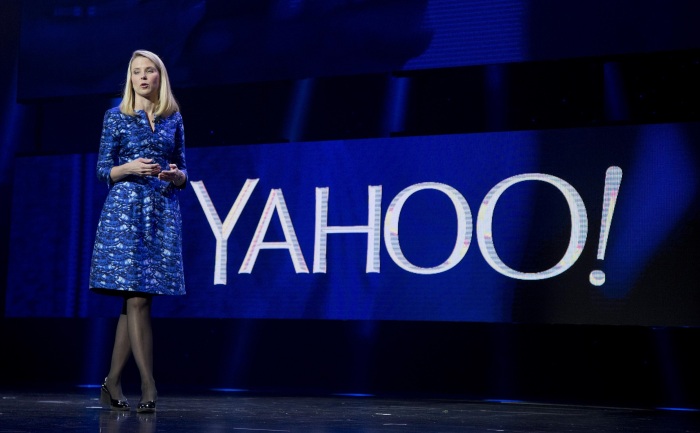In a letter to Yahoo CEO Marissa Mayer, Yahoo investor Starboard Value warns Ms. Mayer that she should avoid making any kind of big acquisition with funds generated from Yahoo’s 2005 investment in Alibaba.
Instead, the money should be doled out to the company’s investors in a tax-efficient manner.

The letter, which was drafted by the hedge fund company’s Jeff Smith, mentions Yahoo’s past interest in acquiring cable networks, and says that if Mayer were to pursue that kind of multibillion-dollar acquisition using the money generated from Alibaba’s IPO, it “would be a clear indication to us that significant leadership change is required at Yahoo.”

Smith goes on to say that Yahoo would be better off combining with AOL:
“A combination with AOL, structured properly, could accomplish all of these goals by allowing for: (i) a tax-efficient separation of the non-core minority equity investments; (ii) tremendous cost synergies of between $1 billion and $1.5 billion; and (iii) a strong growth platform given AOL's progress in mobile and video advertising.”
Diving into the issue a bit deeper, the money in question stems from Yahoo’s acquisition of Alibaba in 2005. The booming Chinese e-commerce company went public three months ago, and the funds it has generated in trading have no clear intention yet.
In the past, Mayer expressed interest in acquiring a number of cable assets, including CNN and Scripps Networks, but the company has not made any sort of formal moves to actually purchase these companies.
All of this bothers Smith because he believes the funds Alibaba is generating on the market should go directly into the pockets of the company’s shareholders. Specifically, he writes that his concerns “are exacerbated as it has now been more than sixty days since the IPO of Alibaba, and Yahoo is now free to disclose its intentions with regard to its shares of Alibaba. However, to date, no announcement has been made regarding Yahoo’s plans for a tax-efficient separation of its non-core minority equity interests.”
One of the things Smith is particularly worried about is Yahoo pursuing a cash rich split-off, wherein the company would swap its stakes in Yahoo Japan or Alibaba for assets, rather than cash; this transaction would then be accompanied by one of those companies making an acquisition, and then flipping the purchased business back to Yahoo.
“The resurfacing of rumors about a cash rich split-off at this juncture is particularly troubling given your acknowledgement at our meeting with you on October 27th that this option would be clearly inferior to a spin-off structure or other available alternatives,” Smith wrote.
As of September 2014, Yahoo was 10.2% of Starboard’s portfolio which, for the hedge fund, is a sizeable piece of property. However, the 7.7 million shares it owns represents just a 0.8% stake in Yahoo.
Worth noting, especially considering Smith’s proposal of a Yahoo / AOL merger, is the fact that the hedge fund firm also owns 2.5% of AOL’s outstanding shares as of September 2014, representing 2.4% of Starboard’s portfolio.
Smith’s entire letter to Mayer reads as follows:
Marissa A. Mayer, President and CEO
Yahoo! Inc.
701 First Avenue
Sunnyvale, California
94089
cc: Board of Directors
Dear Marissa,
We appreciate the constructive and on-going dialogue we have had with you, your management team and certain members of the Board of Directors (the “Board”) regarding the extremely compelling opportunities to create value at Yahoo! Inc. (“Yahoo” or the “Company”). However, we have recently become increasingly concerned due to the growing number of media reports indicating Yahoo's interest in doing large-scale acquisitions. The latest reports speculate that Yahoo may be considering an acquisition of cable assets including Scripps Networks Interactive and Time Warner's CNN. Our concerns that these media reports may have some truth are exacerbated as it has now been more than sixty days since the IPO of Alibaba, and Yahoo is now free to disclose its intentions with regard to its shares of Alibaba. However, to date, no announcement has been made regarding Yahoo's plans for a tax-efficient separation of its non-core minority equity interests.
On a related note, within the past week, new speculation has emerged that Yahoo is considering a cash-rich split-off as a structure to separate its non-core minority equity interests. The resurfacing of rumors about a cash rich split-off at this juncture is particularly troubling given your acknowledgment at our meeting with you on October 27th that this option would be clearly inferior to a spin-off structure or other available alternatives to unlock the full value of the stakes in Alibaba and Yahoo Japan. As we have repeatedly explained, we believe a cash-rich split-off to separate Yahoo's non-core minority equity interests has serious shortcomings:
i) The market value of the 'active trade or businesses' Yahoo would receive as part of the consideration in exchange for its interests in Alibaba or Yahoo Japan would be difficult to ascertain objectively, and could be of questionable value to Yahoo shareholders;
ii) The total consideration that Yahoo would receive in exchange for the Alibaba and Yahoo Japan stakes would likely be lower than the valuation that those assets would garner if they were traded as separate public entities;
iii) Yahoo would retain a substantial amount of cash which could then be used for large and potentially value destructive acquisitions, such as those speculated about in the media; and
iv) It would introduce unnecessary transaction complexities and execution risks given the required third party participation.
As we have made clear in our prior discussions and letters, separating the non-core minority equity interests in the most tax-efficient, value maximizing, and shareholder friendly manner must be Yahoo's top priority. Recent discussions with large shareholders of Yahoo, some of whom have reached out directly to us to express their serious concerns with the rumors pervading the market, corroborate our belief that shareholders expect the Company to execute a tax-efficient separation (i.e. spin-offs) of both the Alibaba and Yahoo Japan stakes.
Further, we continue to believe that Yahoo must significantly reduce costs to improve profitability in its core business and should be considering a combination with AOL. A combination with AOL, structured properly, could accomplish all of these goals by allowing for: (i) a tax-efficient separation of the non-core minority equity investments; (ii) tremendous cost synergies of between $1 billion and $1.5 billion; and (iii) a strong growth platform given AOL's progress in mobile and video advertising.
We understand that you are not in a position to comment on media speculation. However, we expect that you and the Board will heed the advice of shareholders by expeditiously announcing your intentions regarding both of Yahoo's non-core minority equity investments and other actions to enhance shareholder value.
Should you instead choose to proceed down a different path by pursuing large acquisitions and/or a cash-rich split, both of which have been speculated, such actions would be a clear indication to us that significant leadership change is required at Yahoo. We hope our concerns are unfounded and would like to continue our constructive dialogue. We eagerly await the conclusion of your review and the announcement of your intentions.
Best Regards,
Jeffrey C. Smith
Managing Member
Starboard Value LP
Via BusinessInsider, Forbes
Advertisement
Learn more about Electronic Products Magazine





